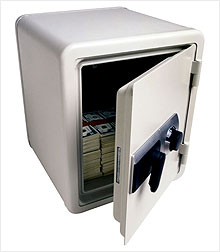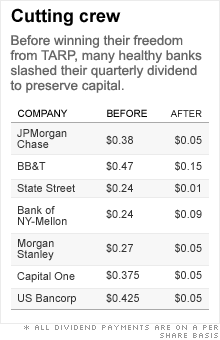Don't bet on a bank dividend rebound
Even after escaping TARP, banks that cut their dividends last year are unlikely to reward rattled shareholders by boosting payouts any time soon.
 |
| Dividends paid out by diversified financial services firms in the S&P 500 like JPMorgan Chase and Bank of America have plunged nearly 92% since March of 2007, according to Thomson Reuters. |

NEW YORK (CNNMoney.com) -- Leaving behind TARP will likely mean a return to the status quo for many banks -- except for those hefty dividends of yesteryear.
Earlier this month, 10 of the nation's biggest financial firms won their freedom from the government's Troubled Asset Relief Program. In theory, that should allow these banks to begin raising their quarterly dividend payments to shareholders again.
Many lenders, including JPMorgan Chase (JPM, Fortune 500) and Capital One (COF, Fortune 500), slashed their dividends before accepting bailout money in a bid to preserve capital, and were prevented by TARP rules from boosting them as long as they remained in the program.
This means that struggling banks stuck in TARP, such as Citigroup (C, Fortune 500) and Bank of America (BAC, Fortune 500), will be unable to raise their dividends for the foreseeable future. Both of those lenders have cut their quarterly dividend to a bare minimum of a penny per share.
Yet, experts widely believe that even the healthiest banks are unlikely to reinstate dividends to pre-TARP levels anytime soon.
"I would think that they would be very cautious until this financial crisis is truly behind us," said Milton Ezrati, senior economist and market strategist at Lord Abbett.
Banks broadly began to cut their dividends in early 2008 in a bid to protect their balance sheets against escalating loan losses.
Even though many investors believe the worst could be over for banks, the threat of further loan losses still looms large for many lenders -- particularly in commercial real estate and credit cards.
In a report published this week, Moody's noted that credit-card charge-offs, or loans a bank considers to be uncollectable, broke through the 10% level in May. The rating agency added that it anticipated that number to keep climbing, however, before peaking at 12% sometime in 2010.
As such, banks are still working hard to shore up their capital levels. And while regulators do not explicitly forbid banks that are free of TARP from raising their dividends, the financial industry overall is preparing for even more regulation.
One proposal floated by the White House last week that appears to have widespread appeal would require banks to hold significantly more capital at any given time so they are better positioned to absorb severe losses in the future.
So until those new standards are hammered out by regulators and lawmakers, banks will likely stay pat on their dividend policy, notes Jill Evans, a portfolio manager for Alpine Funds' Alpine Dynamic Dividend Fund.
"It would be premature that a company would raise their dividend ahead of that," she said.
At one time, banks and financial firms were a virtual goldmine for dividend investors, making up approximately 30% of all dividends paid out by companies in the S&P 500.
Nowadays, that number stands at just 9.1%, notes Howard Silverblatt, senior index analyst at Standard & Poor's.
It's likely to stay in that range for some time.
JPMorgan Chase chief executive officer Jamie Dimon suggested at an investor conference last month that banks may have paid out too big of a dividend in the years leading up to the crisis. Much of that was due to pressure from shareholders.
But given the challenges that banks are currently facing, analysts are skeptical that investors are likely to demand dividend increases anytime soon.
Still, top-tier banks may eventually have no choice but to address the issue if recent signs of a recovery within the industry and economy are sustainable.
Anatoliy Cherevach, an analyst at the Dividend Value Fund at Cohen and Steers, suspects that JPMorgan Chase and Minneapolis-based U.S. Bancorp (USB, Fortune 500) could move to raise their dividend as early as next year.
Goldman Sachs (GS, Fortune 500) and Northern Trust (NTRS, Fortune 500), two financial firms that left their dividend untouched amid the crisis, are two other companies that may consider boosting their dividends before long, Cherevach added.
Of course, some banks could view dividend increases as a way to attract even more investors, which could allow them to raise capital in the future at a higher price.
But with conditions in the financial markets and economy still highly uncertain, few banks would want to raise their dividend if they fear they'd have to cut it again down the road due to a capital squeeze.
"Once you have done a dividend increase, then to take it back, is very hard on the stock price," Ezrati said. ![]()

